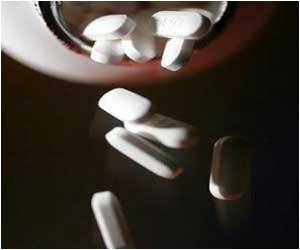Antipsychotic drugs are used for the treatment of psychotic ailments may lead to metabolic derangement.

It therefore, is a wise decision to select a low-risk antipsychotic in people predisposed to high risk of diabetes.
In the United States, diabetes mellitus is the seventh common cause of death and is the chief cause of kidney failure, nontraumatic limb amputation and new onset blindness.
Diabetes also predisposes people to the threat of of cardiovascular ailments and is a largely responsible for prevalence of heart diseases and stroke.
Statistics suggest that diabetes mellitus affects about 8.3 percent of US nationals and this percentage is growing at an alarming rate.
Antipsychotic drugs are known to cause type 2 diabetes mellitus. Antipsychotic drugs are used in the treatment of schizophrenia or affective disorders.
A cross-sectional study, conducted with schizophrenia outpatients revealed the presence of type 2 diabetes mellitus prevalence rate of 11.5 percent.
The scientists observed a relatively shorter onset of diabetes in older patients as compared to younger patients.
Antipsychotic-induced diabetes mellitus commonly affects people with schizophrenia, psychotic depression, bipolar disorder, autism, dementia, or developmental disorder.
Some other less frequent uses of antipsychotic medication leading to the development of treatment-induced metabolic disturbances, are delirium, post-traumatic stress disorder (PTSD), aggressive behavior and personality disorder.
Though the risk factors for the development of antipsychotic-induced diabetes mellitus are quite complex, but sedentary lifestyle, genetic causes, pharmacologic properties of antipsychotic agents and worsening metabolic homeostasis can lead to prevalence of diabetes mellitus.
Scientist believes that antipsychotic agents can cause weight gain, dyslipidemia and type 2 diabetes mellitus.
Antipsychotic agents disturbs metabolism and can cause obesity.
In mentally ill people, metabolic syndrome is quite common besides lifestyle factors such as increased food intake, high carbohydrates consumption, limited physical activity tobacco smoking etc.
The exact association of antipsychotics and weight gain is unknown however; it is believed that antipsychotics can result in weight gain dyslipidemia and hyperlipidemia by binding to serotonin (5-HT), dopamine, norepinephrine and/or histamine receptors.
‘Stimulation of 5-HT1A is associated with an increase in food intake whereas stimulation of 5-HT2C is related to a decrease in food intake. Antagonism of the 5-HT2C receptor for histamine can, in turn, lead to an increase in food intake, with most SGAs possessing 5-HT2C antagonist activity.’
Olanzapine has high affinity for histamine receptors while aripiprazole and ziprasidone have relatively low affinity for receptor affinities.
‘Recommendations for patient monitoring for the development of dyslipidemia, weight gain, and DM have been published.6 They consider the potential metabolic risks when initiating an SGA; patient, family, and caregiver education; baseline screening; and referral to a specialist, if needed, as key components of patient care.6 As weight gain is considered a precipitating factor for the development of DM and dyslipidemia, monitoring of weight changes with treatment is an important screening measure.’
According to the American Diabetes Association, the American Psychiatric Association, the American Association of Clinical Endocrinologists, and the North American Association for the Study of Obesity, baseline and follow-up is essential for monitoring the antipsychotic-induced DM. ‘According to the consensus statement, screening measures are recommended to be obtained before or soon after the initiation of antipsychotic medication.’
Clinicians rare asked to record patient’s height and weight (BMI) prior and after the treatment. ‘Fasting plasma glucose and blood pressure are assessed at baseline, at 3 months, and then annually, while lipids are assessed at baseline, at 3 months, and then every 5 years. If patients are at higher risk to develop DM or hypertension, more frequent monitoring is advised. Using these measures, clinicians can better assess patients’ baseline status for weight (overweight defined as BMI 25-29), prediabetes (fasting plasma glucose 100-125 mg/dL) or DM (fasting plasma glucose ≥126 mg/dL), hypertension (>140/90 mmHg), or dyslipidemia to help determine their risk status and the contribution and/or causation of antipsychotic therapy.’
The clinicians can decide regarding the use of appropriate antipsychotic drugs depending upon the presence of metabolic disorder.
Prompt referral for the management of diabetes mellitus from the experienced physician is advised, if any symptoms of hyperglycemia are present.
Second generation antipsychotic (SGAs) such as olanzapine, aripiprazole, risperidone, clozapine and ziprasidone can result in metabolic syndrome while first generation antipsychotics (FGAs) can contribute to extrapyramidal symptoms (EPS) such as akathisia, dystonia, pseudoparkinsonism, and late-onset tardive dyskinesia.
Olanzapine and clozapine are regarded as the worst offenders for hyperglycemia, weight gain and dyslipidemia.
The scientists noted that lower-risk antipsychotic such as ziprasidone or aripiprazole should be given to people at high risk or with pre-existing diabetes.
In case of hyperglycemia, weight gain or dyslipidemia, low-risk antipsychotics should be given.
Diabetes is becoming a pandemic and self-monitoring of this metabolic disorder is encouraged. Pharmacists can encourage and counsel suitable self-monitoring in patients receiving antipsychotic drugs. They cat as catalysts and play an important role in recognition and intervention to improve the quality of life.
In nutshell it can be said that appropriate monitoring clinician’s awareness and reporting are crucial in the early diagnosis and detection of antipsychotic-induced diabetes mellitus.
Reference:
Antipsychotic-Induced Diabetes Mellitus; Theary Chhim et al; US Pharmacist
Source-Medindia















